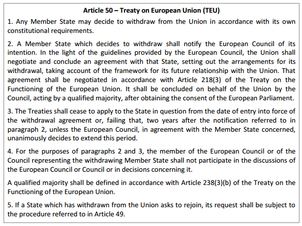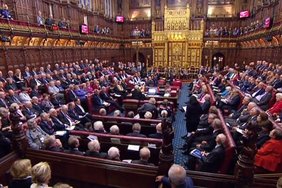|
writes DM director Stuart Coster  Westminster dwellers may have noticed some expensive new anti-Brexit poster vans trundling around the corridors of power. The campaign is reportedly also being replicated on billboards "across the country." 'Stop the Silence', runs the slogan. But a glance at the advertised website reveals only a deafening silence about who exactly is behind the campaign. "The people are speaking," the theme self-contradicts. Although quite how they can speak isn't clear, given those pictured all appear to have their mouths stickered over. So far, so odd. But look beyond the conflicted visuals and it appears that, somehow, these people are managing a muffled mumble about the EU referendum. Apparently, they say, 'we' did not vote for "price hikes" (currency movements actually work both ways), "hate crimes" (nothing to do with Brexit, say the police), "brutal Brexit" (what even is that?) or "deal or no deal" (eh?). The list continues on the campaign's website. More things 17.4 million people supposedly didn't vote for are "leaving the single market" (yes, we did), "WTO rules" (ie. trading like many other major non-EU economies), "losing our funding" (what part of 'net contributor' to EU funds did they miss?) and "losing our rights" (which rights, precisely?). Such a lot of things 'we' apparently didn't vote for. Yet it seems no understanding about what we very clearly did. Like an end to free movement, control over our laws and to halt vast payments into the dodgy EU budget that could be better spent by key public services like the NHS. All frontline Leave campaign messages, debated amply, endorsed by a clear majority, none of which can be delivered if we stay within the single market. With messages so vague and weak that they miss their political targets by miles, Stop the Silence has that detached air of wealthy-yet-politically-inept client meets PR agency who've spent ten minutes googling the brief and, inevitably, come up with lines that have no depth or credibility. Divisive Remain Most shamefully of all, this campaign - just like Fearmonger Farron and his Liberal Democrats - deploys the politics of fear and division towards its vague objectives, by claiming there is a prospect of "losing our families". In its frightening brevity and total, plucked-out-of-the-air, inaccuracy, it's an outrageous and base claim. No-one in government has suggested anything of the sort. In fact, back in January, Theresa May attempted to achieve a reciprocal guarantee for both EU and UK expats, her move only blocked reportedly by "one or two" EU leaders. Yet the government's intentions to resident EU nationals have been made crystal clear. So who's behind this? The Stop the Silence twitter account claims the campaign is "The first national entirely crowdfunded campaign taking a message to Parliament." Except the only evidence of money raised on crowdfunder amounts to nowhere near what it would cost to take the action claimed. Sounds like more weak PR spin. The posters feature a selection of mostly obscure logos, but one prominent link, perhaps tellingly so, on the campaign's website is to Campaign2018, the creatively-titled latest anti-Brexit outburst by Gina Miller. Miller is the investment manager who was so concerned about the powers of parliament over the government that she originally supported the EU continuing to have huge, far less accountable power over both. Fresh from saying it's "over to the politicians now" and that she was going "back to her day job" following the conclusion of her Article 50 legal actions, she now says Brexit can't be left to the "too weak" politicians. Flailing Remain Still confused? It's all quite simple really. Extreme Remainers are floundering. They can't say what they really want - for the public's clear Brexit verdict in June last year to be ignored - lest they're confirmed as the anti-democrats they truly are. Likewise they must also realise that no amount of opinion polling or drumming up public support is going to come near to matching the 17.4 million people who in June last year voted Leave - including, very clearly, to leave the migration, legal and cost implications of the single market. Even more frustrating for the democracy refuseniks, now Article 50 has been triggered the prospect is remote of any mechanism being available within the two year negotiation deadline that can lead to Brexit being blocked. That article of the EU treaty, which they so admire, itself says that after two years the treaty will "cease to apply", deal or no deal, meaningful vote in Westminster or no meaningful vote. And Theresa May is hardly likely to agree to extend talks and take them even closer to a 2020 general election. So instead of facing up to such realities, from the hardcore Remain rump we get meaningless guff from marketing agencies like these weak posters and a media procession of Blair, Heseltine, Major, Osborne and Branson to tell us yet again what a disaster Brexit apparently is. A desperate, tired and inevitably hopeless repeat of the elite PR campaign that lost Remainers the referendum in the first place. If it makes some feel better to lavish cash ineffectually on law firms and PR agencies, then so be it. To be fair to them, supporting EU membership and having no interest in democracy is at least consistent, if only they could be more honest about such views, even with just themselves. But a more sensible plan for grumpy Remainers would be this. Hold on to your cash, learn to respect democracy, campaign for Britain to rejoin the EU again if you must but, like the rest of the country, just try to move on.
2 Comments
writes DM director Stuart Coster  Writing in The Guardian, Liberal Democrat leader Tim Farron shamefully stokes fears that families will be "torn apart" by Brexit, despite there being absolutely no suggestion from anyone in government that this will happen. As well as being simply a nasty ploy, deploying graphic language to whip up fears of turmoil in people's futures that have no basis in reality encourages divisions that, in another breath, Farron and his party claim to reject. Back in January, Theresa May attempted to achieve a reciprocal guarantee for both EU and UK expats, but her move was reportedly blocked by "one or two" EU leaders. The government's intentions to resident EU nationals have been made crystal clear, yet Mr Farron persists in fuelling needless public concerns to serve his own outdated, EU-obsessive ideology. Such Farron fear-mongering goes way beyond existing transgressions against democracy, like his refusal to accept the majority referendum verdict and immediate demands for a repeat vote. He's now engaging in the politics of fear for base party advantage - the sort of desperate stuff Lib Dems frequently accuse everyone else of peddling. Dereliction, contradiction The baleful tactics follow Farron's backing for a Brexit Bill amendment to guarantee EU citizens' rights that would have had the effect of turning more than a million expat Brits into EU bargain chips in the looming Brexit talks. A move that represented an extraordinary dereliction of duty to British citizens by the leader of a UK political party, thankfully shot down by a moderate majority of other MPs. But the hypocrisy doesn't end with whipping up fears that EU residents here are somehow going to be ejected, while claiming to 'reject division' and want a 'united' Britain. Or indeed Farron's party doing everything they can for years to block an EU referendum happening at all, then immediately demanding another referendum when they don't like the result. Much more of the Lib Dem response to the referendum verdict is also packed with contradictions. A frequent, yet self-evidently bizarre, claim is that 17.4 million Leave backers didn't know what they were voting for, while another runs that people didn't vote to leave the EU single market. Somehow, Mr Farron and his party know what Leavers voted for or against, even though we all ourselves apparently didn't know at the time? How spectacularly perceptive! Then they wail that Brexit is an economic disaster, yet dismiss every frequent post-referendum piece of good news - like Vodafone's recent £2bn investment announcement creating over 2,000 jobs, the continued interest of major overseas investors, or the latest further fall in unemployment (the list goes on) - as simply due to Brexit not having happened yet. As if such major decisions to invest or create jobs were being taken by those with no foresight to assume that Brexit is going to happen in the not-too-distant future. Richmond hype The Lib Dems' democracy-refusenik attitude to the EU referendum may have been pushed into overdrive by the result of last December's by-election in Richmond Park. But, in reality, that event was very far from the uprising against Brexit that the party hyped. Their candidate Sarah Olney only just beat an independent rival who did not benefit from the absolutely huge resources of a party machine and despite deluging the constituency with mountains of leaflets hammering a pledge to block Brexit, the Lib Dem vote amounted to less than half of Richmond's Remain supporters at the referendum. So for all Farron's unprincipled, anti-democracy rhetoric, the by-election result actually suggested his party isn't representing the 48% as only up to 20% of them who may still share his refusal to respect the referendum result. No-one is suggesting Remain voters need to change their views about the EU, despite silly or disingenuous protests that this is what insisting the referendum result be respected amounts to. A more credible and democratic response to the EU referendum outcome by those who continue to support EU membership would be to argue that Britain should one day rejoin, not set out to block the majority Leave verdict being delivered. Little to lose? A quest to refuse the majority referendum decision may go down well in those constituencies with big Remain votes during low by-election turnouts. Even up to 20% of voters will look a tempting target to a party with only 9 MPs. It no doubt seems to Tim Farron that, despite his debauched politics, he has little to lose. But he's wrong. The Lib Dem leader ought to be a lot more concerned that his tactics are attracting the attention of several successful campaign groups with large Brexit activist networks, looking for new political challenges and with the financial clout to mount significant grassroots campaigns. The sheer scale of Farron's nasty, divisive fear-mongering, hypocrisy and blatant contradictions could well provoke some to start pointing out relentlessly the many manifest failings in his response to the EU referendum to all voters in his party's existing seats, all of which except just his own are extremely vulnerable, as well as in his 2020 election targets. So while Farron may think he's making hay with the 48%, or more likely the 20%, general elections are a different story. Even since December, more people have moved on as events unfold, accepting the referendum result and, even if unenthused, looking now to make the best of it. That's why the ultimate price for continuing abject disrespect for democracy and a debasing politics of fear could easily turn out to be the few remaining vestiges of the Lib Dems' credibility and popular support. writes DM director Stuart Coster  In a supreme irony, EU obsessive Lords and MPs look set to suffer the powerlessness of parliament under the EU treaty to which Leave campaigners, in the name of democracy, have long objected. Though it comes as little surprise that those who are so enthusiastic about the EU seem to know so little about the real terms of our membership. Commentators are saying that MPs, including some Conservative rebels, are plotting to approve House of Lords amendments to the Article 50 Bill requiring a “meaningful vote” on the eventual outcome of the government's negotiations with Brussels and setting a deadline to guarantee the rights of EU citizens living in the UK. As I wrote earlier this month, the House of Lords has engaged in an extraordinary dereliction of duty to UK citizens - as will any MP who now supports their amendment - by seeking to turn more than a million expat Brits into EU bargaining chips, rather than allow the government to strike a fair, reciprocal Brexit residency deal. As perverse proposals go, that's hard to top. But their oxymoronic quest for a "meaningful vote" on a future Brexit deal does it, since those backing this amendment can't even have read Article 50 itself. Had they troubled to, they would know that hopes that future votes in parliament can halt, or even delay, Brexit are forlorn. Paragraph 3 of Article 50 says that once the exit clause is triggered, EU treaties simply "cease to apply" to the exiting country after two years. There is a provision to extend the talks, by mutual agreement, but no ability for either side to 'stop the clock' or change that destination. So if this amendment is approved, MPs and peers may well, in 18 months or so's time, get to vote down the government's Brexit deal. No doubt that will make parliament's referendum result refuseniks feel very pleased with themselves. But guess what? Regardless of any Westminster votes, the Article 50 clock will still be ticking and, with every further disingenuous objection to aspects of the deal, Brexit with no deal at all will simply loom ever closer. Can it really be the case that parliament's biggest EU fans haven't figured out, even yet, that under Brussels rule its not them but the EU treaty that will get the final say? Some will no doubt be hoping that rejecting any Brexit deal might at least force the Prime Minister to extend talks with the EU and keep negotiations going indefinitely. But they are also doomed to disappointment. Theresa May will not want talks to crash the build-up to a likely May 2020 general election and has already said that no deal is better than a bad deal. A scenario, incidentally, that the EU will be desperate to avoid, with its multi-billion pound annual trade surplus with the UK and, not least, huge French, German and Italian car industry sales to the vibrant UK market to protect. Faced with parliament's rejection of her negotiations, Mrs May is far more likely to let talks run out of time and have rejectionist Remainers carry the can for creating the very economic scenario about which they have been trying to whip up public disquiet. Even if, somehow, the PM were minded to agree to extend talks with the EU in order to accommodate parliament's criticism of her deal, what then? Brexit Day will simply come later rather than sooner and, as it approaches, parliament will still face a 'deal or no deal' moment that they are currently hoping to weaponise. The aim of those driving this amendment is clearly to block Brexit altogether, by creating a series of future diversions rather than one big roadblock. All the better to disguise their fundamentally anti-democratic attitudes. But they have yet to grasp the irony of how their broader support for the supremacy of EU law, including in this case Article 50's two year deadline, leaves in tatters their disreputable quest to refuse to deliver the verdict of a public vote. Peers can afford to lay waste to their time and reputations by adding irresponsible and powerless provisions to the Brexit Bill. But can Conservative, and indeed many Labour MPs in majority Leave constituencies, really risk doing the same by supporting them? writes DM director Stuart Coster  UK citizens living in the EU will be turned into bargaining chips in the forthcoming Brexit negotiations, as a result of Wednesday’s vote in the House of Lords. If Peers get their way, the rights of EU nationals to continue living in the UK will be guaranteed, but those UK citizens living in the EU will remain open to question. A factor the EU will undoubtedly use to its considerable advantage over the government when Brexit talks begin in earnest. This move by the 358 Peers who backed amending the Article 50 Bill represents an extraordinary dereliction of duty to its citizens by a UK governing institution and is a self-inflicted hammer blow to the Lords’ already precarious legitimacy. An offer of a reciprocal guarantee to all UK and EU residents was, rightly, made by the government back in January. But according to Theresa May, the deal was rejected by “one or two” EU leaders. So the government can hardly be held responsible for the uncertain situation in which that refusal leaves the citizens of those countries. The Lords’ actions have even disappointed groups representing EU residents and UK expats. A coalition of 13 groups responded with concern that “the amendment makes no mention of UK citizens in the EEA” who were “also facing huge uncertainty about their futures, livelihoods and the security of their families – the same concerns facing EU and EEA citizens in the UK,” said coalition spokesman Jeremy Morgan QC. The House of Lords already stands on increasingly unstable foundations. Membership has grown beyond reason to over 800. There are ever more frequent reports of Peers adopting a ‘cash in, clock off’ approach to their £300 daily attendance allowance. Lifetime rights to a say over our laws have been granted to an array of political party workers, spin doctors and short-term ex-MPs kicked out by public vote but projected straight back into parliament’s second chamber. The Liberal Democrats enjoy the influence wielded by over 100 Peers yet public votes have left them with just 9 MPs. Talk of reform has, as a result, been growing. For Peers to now go out of their way to leave a million UK expats high and dry in the Brexit negotiations will inject huge new impetus to demands for change or indeed complete replacement of the institution. MPs will at least get the opportunity to reject this extraordinarily ill-judged amendment. In doing so they must take the chance to remind the House of Lords exactly who they are meant to be there to serve. |

Follow us on twitter:
@DemocracyMovemt Democracy Movement BlogNews, comment and debate towards a better democracy, international co-operation and against the out-dated political integration driving development of today's EU. Recent archivesCategories |
|
The Democracy Movement, Marlborough House, High Street,
Hartley Wintney, Hampshire RG27 8NY T: 020 3637 4546 E: campaign @ democracymovement.org.uk © 2023 Democracy Movement. All rights reserved. |
Our legal status is as a registered company, limited by guarantee - a non-profit status. No. 3673846. In accordance with legal requirements, we file annual accounts and the details of our directors every year with Companies House.
Privacy statement: We will not pass on your contact details to any other organisation or use them for any purposes other than promoting the activities of our campaigns. |

 RSS Feed
RSS Feed